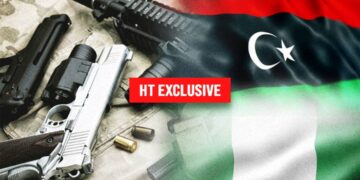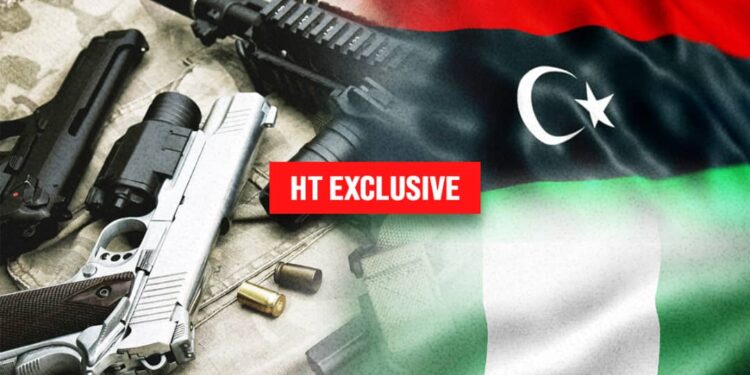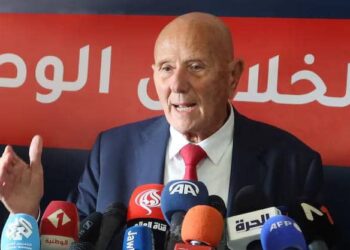By Enyichukwu Enemanna
The security circle in Nigeria has consistently grappled with the influx of sophisticated weapons, which make their ways from the country’s illegal border entry points numbering over a thousand, according to experts. This development is largely believed to have fuelled the escalating security concerns in Africa’s most populous nation where ISWAP-affiliated Boko Haram Islamist group has since 2009 held large swathe of territory, killed nearly 350,000 according to UN, with millions of others displaced from their ancestral homes, particularly in the northern region.
Neighbouring countries, such as Niger, Togo, Benin Republic, Burkina Faso and Mali have all been dealing with one form of armed group or the other, expending humongous chunk of their national budgets towards curtailing the activities of these non-state actors whose activities negate economic growth and national development.
Experts have fingered Libya as the largest supply source for light and heavy weapons in West Africa, especially in Nigeria, accounting for nearly 80% of such arms that have emboldened cult, kidnapping and arm robbery gangs, as well as bandits who operate almost unchallenged in Zamfara, Plateau, Kaduna and other parts of North West and North Central regions of Nigeria.
READ ALSO: JUST IN: Putin Wins Russian Presidential Poll By Over 87%
Worried by the large cache of weaponry under the control of criminal gangs, former Nigerian President, Muhammadu Buhari in 2021 through an Executive directive ordered the creation of the National Centre for the Control of Small Arms and Light Weapons (NCCSALW), in line with the Article 24 of ECOWAS Convention on Small Arms and Light Weapons (SALW). The centre under the office of the National Security Adviser (NSA) is charged with the responsibility of preventing and controlling the proliferation of SALW in collaboration with stakeholders towards strengthening peace and security in Nigeria. So far, has SALW assisted in deepening a weapons-free society for development and socio-political well-being of Nigerian citizens?
Libya’s 2011 Armoury Looting
In 2011, a wave of popular demonstrations against entrenched regimes in Middle East and North Africa brought about transfers of power in Egypt and Tunisia. In Libya, however, an uprising against the four-decade rule of Muammar Gaddafi led to civil war and international military intervention.
The protesters called for Gaddafi to step down and for the release of all political prisoners, including a human rights lawyer, Fethi Tarbe. Libyan security forces used water cannons and rubber bullets against the crowds, resulting in a number of injuries.
As the protests intensified, with demonstrators taking control of Benghazi and unrest spreading to Tripoli, the Libyan government began using lethal force against demonstrators, instead of the rubber bullets. Security forces and squads of mercenaries fired live ammunition into crowds of demonstrators.
Demonstrators also were attacked with tanks and artillery and from the air with warplanes and helicopter gunships. The regime restricted communications, blocking the Internet and interrupting telephone service throughout the country. On February 21, one of Gaddafi’s sons, Sayf al-Islam, gave a defiant address on state television, blaming outside agitators for the unrest and saying that further demonstrations could lead to civil war in the country. He vowed that the regime would fight “to the last bullet.”
Clashes continued, but Gaddafi’s firm grip on power weakened as Libyan military units increasingly sided with the opposition against the regime. They opened the country’s armoury, allowing the demonstrators to acquire weapons from government arms depots and joined forces with defected military units.
The anti-Gaddafi movement began to take the form of an armed rebellion. The newly armed rebel forces were able to expel most pro-Gaddafi troops from the eastern portion of Libya, including the city of Benghazi, and many western cities by February 23.
Interpol Systems Consultant and security expert, Sir Chikwe Udensi told Heritage Times HT that when the civil war ended, majority of the looted weapons were not returned to the government armoury, but found their way to the black market, majority of which was shipped to Nigeria.
“If you look at what we call the firearm index, by that I mean, if you are investigating a firearm for instance, you look out for the serial number. This will tell you the manufacturer, it will tell you the initial dealers of the firearm and the country that purchased the firearm. The index will tell you that.
“About 85% of light arms and ammunition that came into this country came from Libya. When Libya failed, the armoury was looted. That was what created the problem and look at the proximity of Libya to Nigeria. The demand for such items was higher in Nigeria than other countries around it. These are the sources.
“Also, given that our borders are so porous. We were looking at the records we have, which indicate that Nigeria has about five major entry points and then we have 22 minor entry points into the country.
“When I talk about minor entry points, it’s very shameful. You are talking about a drum at the two ends of the road, then crossed with a bamboo stick. That’s the border control post. But beyond the five major and 22 minor entry points, do you know we have over 2000 illegal entry points? This was a study of about 18 months on the borders of the country.
“If you have 2000 illegal entry points, for both human and vehicular traffic, it is a recipe for disaster and national insecurity,” he stated.
178,459 Missing Arms From Police Armouries
There is also the security dimension to the humongous number of weapons being wielded by non-state actors in Nigeria. In January 2022 for instance, Heritage Times HT recalls that Office of the Auditor-General for the Federation reported that about 178,459 different types of arms and ammunition were missing from the Nigeria Police armouries in 2019. According to the report submitted to the National Assembly, 88,078 of the missing arms were AK-47 rifles, while 3,907 are made up of other assorted rifles and pistols from different police formations nationwide.
This raises suspicion that some agents of the state who have access to the armoury of the security formations may have played a role in enriching the supplies of these instruments of death to criminal elements across the country. This is in addition to arms lost through killing of policemen and other security agents by armed gangs.
A report found that 17 per cent of the weapons seized from Boko Haram-linked rebels were diverted from the stockpiles in Chad, Niger and Nigeria. These weapons add to the caches illegally trafficked or smuggled handguns and shotguns sold in the black market, and diversion of legally imported firearms and explosives within the sub-Saharan Africa region.
Geneva-based Small Arms Survey estimates that worldwide, more than 857 million SALWs are currently in circulation apart from 12 billion rounds of ammunition produced annually. Of these, 10 million SALWs are estimated to be in Africa; one million of these are in Nigeria. Ongoing conflicts in Liberia, Sierra Leone, Ivory Coast, Chad, Niger, Mali, and Libya may have also goaded the arms in Africa.
Nigeria’s Defence Headquarters document says between June and September 2023, military forces seized about 5,154 munitions from various theatres of operation. Before then, the National Centre for the Control of Small Arms and Light Weapons had in February announced that it recovered over 10,000 SALWs from non-state actors. While these may seem commendable, it is only a drop in the ocean compared with millions still in circulation.
Endless Agony of Hapless Citizens
Amidst economic woes, exacerbated by skyrocketing inflation, uncontrolled reduction in value of local currency the Naira, loss of livelihoods, communities now resort to go-fund-me to raise money to pay for ransom in order to secure the release of their loved ones from kidnapping gangs. Others auction out their properties to ensure that their loved ones are freed from the fangs of armed men. No part of the country is safe as gun-toting marauders abduct travellers for fun, sack farming communities and cause residents to live in perpetual fear and tension.
Abuja, the country’s seat of power, where the President resides and where all the security, intelligence and armed forces are headquartered has in recent times come under constant attacks by armed groups.
The January 7 abduction in Sagwari Layout Estate in Dutse, Bwari Area Council of FCT where nine persons including a mother and her four children were whisked away, Heritage Times HT recalls attracted a widespread outcry. While the ransom was being sourced, one of the children, 21-year-old Nabeeha Al-Kadriyar was killed by the impatient abductors, stoking anxiety among residents.
Also from an estate behind the Nigerian Army Post-Service Housing Scheme in Kurudu Estate in the Federal Capital Territory (FCT), three persons were kidnapped. Kurudu one of the communities on the border between the FCT and Nasarawa State. Hardly has the state security forces conducted a safe rescue mission as families end up buying the freedom of their loved ones, which further embolden these dark agents.
FCT was once considered relatively safe from prevalent security challenges that confronted other parts of the country. This is however not the case anymore, as escalating wave of criminal activities, particularly kidnappings is now reported nearly on daily basis.
At the heart of these is the availability of these weapons in the hands of wrong persons. Tougher measures, including going after the arms barons, the corrupt security operatives aiding them, and improving border security are required to give succour to the troubled minds of the masses.
At the regional level, the establishment of common platforms to foster collaboration to track and trace illegal weapons among African Union nations and the countries of the Sahel and the Lake Chad Basin could assist in curtailing the spread of these arms and ammunitions.

































